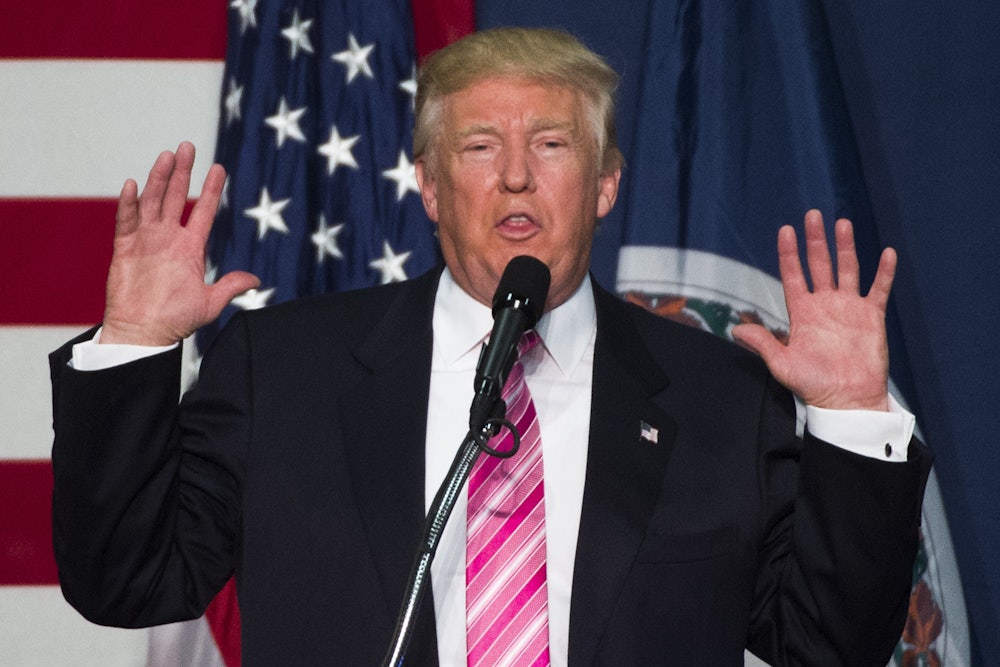Donald Trump’s transition from the primaries to the general election has been a long exercise in proving the adage that a leopard can’t change his spots. Trying to soften his reputation as a bigot, he has employed a classic tactic that serves only to reinforce prejudice: divide and conquer. In theory, Trump is making an effort (however cynically motivated) to reach out to African-Americans and LGBTQ Americans, two groups that haven’t been particularly fond of the Republican Party. But Trump’s appeal to these groups is based on ginning up anger at other minority groups (undocumented immigrants and Muslim-Americans), which is certain to be a self-defeating ploy.
“No community in this country has been hurt worse by Hillary Clinton’s immigration policies than the African-American community,” Trump said in a speech in Wisconsin last Tuesday. “Now she is proposing to print instant work permits for millions of illegal immigrants, taking jobs directly from low-income Americans.” In a subsequent speech on Friday in Dimondale, Michigan, Trump used similar divide-and-conquer language by arguing that helping refugees hurts African-Americans: “Hillary Clinton would rather provide a job to a refugee from overseas than to give that job to unemployed African-American youth in cities like Detroit who have become refugees in their own country.”
The same pitting of one group against another can be seen in Trump’s outreach to the LGBT community, where he’s argued since the Orlando nightclub massacre that his policies can protect them from Islamic terrorism. “The LGBT community is just—what’s happened to them is just so sad, and to be thinking about where their policies are currently with this administration is a disgrace to that community,” he argued in mid-June. “I will tell you right now. Clinton wants to allow radical Islamic terrorists to pour into our country. They enslave women and they murder gays. I don’t want them in our country.”
Trump’s divisive appeal to African-Americans and the LGBT community is unlikely to bear much electoral fruit. Trump, who has called Black Lives Matter “inherently racist,” talks condescendingly about African-American issues. At a Monday night rally in Ohio, he asked the overwhelmingly white crowd, “Look, it is a disaster the way African Americans are living, in many cases, and, in many cases the way Hispanics are living, and I say it with such a deep-felt feeling: What do you have to lose?” And it’s hard to take the Republican nominee seriously on LGBTQ rights when he and his running mate oppose marriage equality.
Beyond Trump and the Republicans’ lack of credibility with minority groups, there is the simple fact that divisive politics is likely to make members of those groups suspicious, because they know that they could easily be targeted in the same way under different circumstances. If Trump can use African-American economic interest to bash refugees, then he could use white American economic interests to bash African-Americans. And if he can use fear of Muslim immigrants to garner LGBT votes, then he could use fear of LGBT people to garner homophobic votes.
Jimmy LaSalvia, a LGBT activist and former Republican, expressed it well when he responded to Trump’s gambit by telling The Hill that “gay people whose lives have always been used as political pawns have a strong distaste for his divisive politics. That ‘us vs. them’ marginalizing of different groups because of who they are really hits home for most LGBT voters.” African-Americans have been similarly skeptical of the pitch he’s made to them.
By turning to divide-and-conquer rhetoric, Trump has illustrated why it’s always been a fantasy that he could pivot away from the bigotry that launched his campaign. He can repackage that bigotry all he wants, but it’s too fundamental to who he is—as a politician, and as a person—to give it up.
